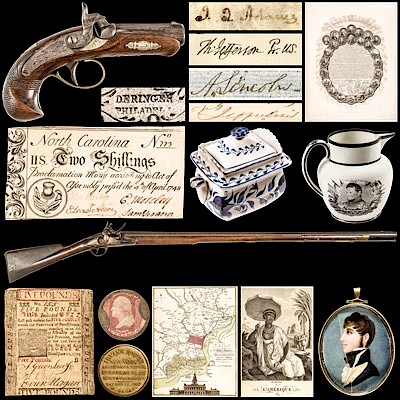1951 CHAIM WEIZMANN First President of Israel TLS to Pioneer Moshe Smilansky
Lot 117
Categories
Estimate:
$1,400 - $1,800
Absentee vs Live bid
Two ways to bid:
- Leave a max absentee bid and the platform will bid on your behalf up to your maximum bid during the live auction.
- Bid live during the auction and your bids will be submitted real-time to the auctioneer.
Bid Increments
| Price | Bid Increment |
|---|---|
| $0 | $10 |
| $200 | $20 |
| $300 | $25 |
| $500 | $50 |
| $1,000 | $100 |
| $2,000 | $200 |
| $3,000 | $250 |
| $5,000 | $500 |
| $10,000 | $1,000 |
| $20,000 | $2,000 |
| $30,000 | $2,500 |
| $50,000 | $5,000 |
| $100,000 | $10,000 |
| $200,000 | $20,000 |
| $300,000 | $25,000 |
| $500,000 | $50,000 |
About Auction
By Early American History Auctions
Oct 19, 2019
Set Reminder
2019-10-19 12:00:00
2019-10-19 12:00:00
America/New_York
Bidsquare
Bidsquare : Historic Autographs-Currency-Political-Americana-Militaria-Guns
https://www.bidsquare.com/auctions/early-american-history-auctions/historic-autographs-currency-political-americana-militaria-guns-4513
326 Lots of Rare, Historic Autographs, Americana, Civil War Era, George Washington, Abraham Lincoln, Black History, Revolutionary War Era, Colonial America, Federal Period, War of 1812, Colonial Currency, Indian Peace Medals & more... Early American History Auctions auctions@earlyamerican.com
326 Lots of Rare, Historic Autographs, Americana, Civil War Era, George Washington, Abraham Lincoln, Black History, Revolutionary War Era, Colonial America, Federal Period, War of 1812, Colonial Currency, Indian Peace Medals & more... Early American History Auctions auctions@earlyamerican.com
- Lot Description
Autographs
Excellent 1951 "Chaim Weizmann" Typed Letter Signed as 1st President of Israel to Moshe Smilansky (1874-1953) Hebrew writer and agricultural pioneer
CHAIM WEIZMANN (1874-1952). First President of Israel. He served until his death in 1952.
September 17, 1951-Dated, Typed Letter Signed, "Chaim Weizmann", in Hebrew as 1st President of Israel, 6.5" x 8.75", Choice Very Fine. Two small standard file holes at right side. This Letter is written to Moshe Smilansky the Hebrew Writer and Agricultural Pioneer, at the begining of the Jewish New Year. Written in Hebrew, translated to English, in full:
"State of Israel - President of Israel - September 17 1951 --- Dr. Chaim Weizmann - Honorable Moshe Smilansky, Rehovot --- Dear Friend, --- I am very pleased with the opportunity to put together your New Year's blessing, and my gratitude for the book you have been asked to send to me at the time. I wish you a long and perpetual life in your important work ("Family of the Soil") a teacher of the prophecies of the time and conditions of today. In friendship and with great gratitude, - (Signed) Chaim Weizmann - Dr. C. Weizmann, President of Israel".
Chaim Weizmann received his education in biochemistry in Switzerland and Germany. Already in Geneva, he became active in the Zionist movement. In 1905 he moved to England, and was elected to the General Zionist Council.Weizmann's scientific assistance to the Allied forces in World War I brought him into close contact with British leaders, enabling him to play a key role in the issuing of the Balfour Declaration on November 2, 1917, in which Britain committed itself to the establishment of a Jewish home in Palestine.
In 1918, Weizmann was appointed head of the Zionist Commission sent to Palestine by the British government to advise on the future development of the country. There, he laid the foundation stone of the Hebrew University. That same year Weizmann met in Aqaba with Emir Feisal, son of Sharif Hussein of Mecca, the leader of the Arab movement, to discuss prospects of reaching an understanding on the establishment of independent Arab and Jewish states
Shortly after, Weizmann led the Zionist delegation to the Peace Conference at Versailles, and in 1920 became the president of the World Zionist Organization (WZO). He headed the Jewish Agency which was established in 1929.
In the 1930s, Weizmann laid the foundations of the Daniel Sieff Research Institute in Rehovot, later to become the Weizmann Institute, a driving force behind Israel's scientific research. In 1937, he made his home in Rehovot. Chaim Weizmann again served as President of the WZO from 1935-1946. During the years that led up to World War II, he invested much effort in establishing the Jewish Brigade. He also tried, unsuccessfully, to prevent the issuing in 1939 of the White Paper, which in effect halted Jewish immigration to Palestine.
During the Zionist Congress held in Geneva in August 1939, Weizmann harshly criticized the British government for its betrayal of the Mandate and the Jewish people.
After World War II, Weizmann was instrumental in the adoption of the Partition Plan by the United Nations on November 29, 1947, and in the recognition of Israel by the United States. With the declaration of the State of Israel, Weizmann was chosen to be the first President of Israel. He served until his death in 1952.
MOSHE SMILANSKY (1874-1953). Hebrew writer and agricultural pioneer Moshe Smilansky left Russia for Palestine in 1890. In 1893 he settled in Re?ovot where he was the owner of orange groves and vineyards. Chaim Weiamann made his home in Rehovot in 1937. A pioneer farmer and a distinguished author, Smilansky was the founder and leader of the Jewish Farmers Federation. He was one of the first settlers in Rishon L'Zion, Israel's oldest settlement. During World War I, he was active in enlistment to the Jewish Legion and volunteered himself. His books, in Hebrew and English, were highly praised. Smilansky was greatly respected by the Arabs. On his 60th birthday the Farmers Federation established a settlement "Kfar Moshe" in his honor and published his collected works.
- Shipping Info
-
Early American provides in-house worldwide shipping. Please contact us directly if you have questions about your specific shipping requirements.
-
- Buyer's Premium



 EUR
EUR CAD
CAD AUD
AUD GBP
GBP MXN
MXN HKD
HKD CNY
CNY MYR
MYR SEK
SEK SGD
SGD CHF
CHF THB
THB












